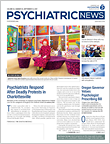Collaborative care has a way of stretching the skill sets of all involved. Over the past few years, we have come to realize the importance of treating not only common mental disorders but also addiction problems in primary care. Mark Duncan, M.D., shares his experience treating patients with substance use disorders in a collaborative care model and shows us that leveraging the strengths of collaborative care for addiction treatment has much promise. —Jürgen Unützer, M.D., M.P.H.
Identifying the treatment that will be most effective for each patient with a mental illness has long been a challenge, sometimes extending patients’ suffering. This tragic story is being retold in dramatic fashion by the current opioid epidemic. At the same time, momentum behind collaborative care is building due to its substantial evidence base, a $2.9 million dollar grant to APA from the Centers for Medicare and Medicaid Services to train 3,500 psychiatrists to work in a collaborative care setting, and the recent release of reimbursement codes by Medicare.
This momentum isn’t surprising when you look at the key elements of collaborative care, which includes the patient-centered approach, population-based care, measurement-based treatment to target, evidence-based treatment, and accountable care. Patients with chronic mental health conditions get better faster and stay better longer. Because collaborative care is based on these elements, the model can—and should—be applied to the treatment of addiction.
The evidence base for treating substance use disorders indicates that regular follow-up, medication-assisted treatment, psychosocial interventions, promotion of medication adherence, and case management are important features for successful treatment. They are all supported within a collaborative care model and are transferable to patients who have an addiction.
At my collaborative care sites, the care coordinator and I carefully review the registry each week to make sure patients do not fall through the cracks. For example, one patient I consulted on at a collaborative care site in rural Washington state had an alcohol use disorder and was on naltrexone. In addition to promoting his adherence to naltrexone and reviewing relapse-prevention strategies, the care coordinator helped the patient set up treatment dates, promoted participation in 12-step groups, and checked in about his ongoing depressive symptoms. And, as the consulting psychiatrist, I provided weekly guidance to the care coordinator around the patient’s relapses and supported the primary care provider’s use of naltrexone.
Measurement-based care is also a valuable tool within the collaborative care model. Currently, urine drug screens and retention are the primary measures for the treatment of addictions, but they are arguably crude in regard to a patient’s complicated recovery process. Nevertheless, these measures and others should be a regular part of treatment because of the potential to narrow the treatment focus at the individual level, identify people at risk for relapse, and provide a way to measure treatment success across the clinical setting.
There are also inherent challenges to the use of the collaborative care model for the treatment of substance use disorders. Clinic systems may not want to treat patients with addiction. As the consulting psychiatrist, I am dependent on primary care providers’ willingness to prescribe medications like buprenorphine and naloxone. In the clinics in which I consult, I can support primary care professionals in their use of these medications, just as I do regarding their use of lithium for bipolar patients. But the lack of psychiatric consultants who can provide that level of support to the collaborative care treatment team is an unfortunate reality. The same is true of care coordinators, although this can be overcome with a well-trained consulting psychiatrist providing support.
Another challenge is the lack of an established measure for the treatment of addictions. The Brief Addiction Monitor is promising and being widely implemented in some health care systems, but there is no clear consensus on an equivalent PHQ9 for addictions.
No one will dispute that the need for addiction treatment is great and that leveraging the strengths of the collaborative care model makes sense to help increase access and provide quality care. The challenges within this approach are not insurmountable, and the development of measurement tools and addiction training through programs like the Extension for Community Healthcare Outcomes (ECHO) are providing primary care providers with the necessary tools and skills to treat substance use disorders in primary care.
What is particularly exciting to me is that collaborative care fully integrates evidence-based addiction, mental health, and medical care in a well-supported team environment that holds itself accountable to patients to improve their outcomes. ■
More information on ECHO can be found in the
Psychiatric Services article “Enhanced Primary Care Treatment of Behavioral Disorders With ECHO Case-Based Learning,” can be accessed
here. More information about APA’s collaborative care training for psychiatrists is available
here.

